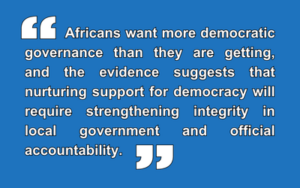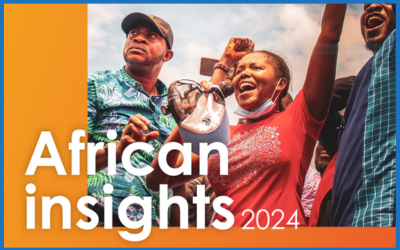The Executive Summary of the report “African insights 2024, Democracy at risk – the people’s perspective” is reproduced below. Researched and published by the nonprofit organisation AFROBAROMETER* it gives an overview on the current perception that Africans have on the state of Democracy in Africa.
Africa’s democratic project faces challenging times. Since 2020, soldiers have pushed out elected governments in six countries. Three presidents have defied constitutional limits to claim third terms in office. Other leaders use subtler means to erode democracy, weakening checks on their authority and harassing the political opposition. Non-compliance by member states frustrates the African Union’s progress in enforcing democratic norms.
These setbacks overshadow successful elections, ruling-party transitions, the ouster of long-sitting presidents, the strong showing of the judiciary in electoral disputes, and other – very real – democratic advances, and fuel dire warnings from stakeholders that democracy is losing ground on the continent.
Afrobarometer has documented the democratic aspirations and experiences of African citizens for the past 25 years. This report, the first in what will be an annual series on high-priority topics, distills findings from data spanning more than a decade, including the latest round of nationally representative surveys in 39 countries, representing the views of more than three-fourths of the continent’s population. In a nutshell: Africans want more democratic governance than they are getting, and the evidence suggests that nurturing support for democracy will require strengthening integrity in local government and official accountability.
 As detailed in this report, most Africans prefer democracy to any other system of government and reject non-democratic alternatives, including military rule. They also strongly endorse norms, institutions, and practices associated with democratic governance, such as choosing political leaders through the ballot box, constitutional limits on presidential tenure, presidential compliance with court rulings, parliamentary oversight of the executive, media freedom, and multiparty competition. Remarkably for a continent with huge gaps in government services, a clear – and growing – majority say it is more important for a government to be accountable to the people than to “get things done.”
As detailed in this report, most Africans prefer democracy to any other system of government and reject non-democratic alternatives, including military rule. They also strongly endorse norms, institutions, and practices associated with democratic governance, such as choosing political leaders through the ballot box, constitutional limits on presidential tenure, presidential compliance with court rulings, parliamentary oversight of the executive, media freedom, and multiparty competition. Remarkably for a continent with huge gaps in government services, a clear – and growing – majority say it is more important for a government to be accountable to the people than to “get things done.”
Other trends portend danger for the continent’s democratic development. Over the past decade, popular support for democracy has declined sharply in several countries, including Mali, Burkina Faso, South Africa, Namibia, and Guinea. Opposition to military rule has weakened: More than half of Africans express a willingness to tolerate military intervention “when elected leaders abuse power for their own ends,” even though two-thirds reject institutionalised military rule. While Africa’s youth differ little from their elders in their support for democracy, they express a greater willingness to tolerate military intervention.
If indicators of popular support for democracy offer reasons for both optimism and concern, Africa’s perceived supply of democracy continues to lag behind its citizens’ aspirations, and people are increasingly dissatisfied with the way democracy is working in their countries. Indicators of democratic and accountable governance delivered by elected leaders have either been declining over time, as in the case of presidential respect for the courts and Parliament, or have remained stagnant at very low levels, as in the case of equal treatment before the law.
What is driving these trends? Analysis of Afrobarometer data shows that while popular satisfaction with democracy is highly susceptible to economic, social, and political performance, support for democracy is resilient against economic factors such as poverty and poor economic management. Instead, the evidence points to political factors, including rising corruption in local government, poor-quality elections, and a lack of presidential accountability, as factors that tend to undermine popular faith in democracy.
We explore some of these trends, as well as the widely varying experiences of individual countries, with brief case studies on South Africa, Mali, Kenya, Zambia, and Senegal. Country democracy scorecards present graphic illustrations of Afrobarometer findings on the most critical indicators of democratic demand and supply.
The data consistently reveal that while there is still a deep well of democratic support on the continent, it is not a bottomless one. The fact that even long-standing democracies such as Botswana and Mauritius are failing to live up to their citizens’ expectations must be marked as an important early warning signal. The failure of governments to deliver democratic and accountable governance threatens to undermine the democratic project on the continent and leave citizens increasingly disappointed in, and at odds with, political authorities in the coming years. Countering these political failings must be a priority for African governments, as well as for regional, pan-African, and international actors committed to strengthening democracy on the continent.
Key findings
Support for democracy
- On average across 39 countries, support for democracy remains robust: Two-thirds (66%) of Africans say they prefer democracy to any other system of government, and large majorities reject one-man rule (80%), one-party rule (78%), and military rule (66%).
- But across 30 countries surveyed consistently over the past decade, support for democracy has declined by 7 percentage points, including by 29 points in South Africa and 23 points in Mali.
- Opposition to military rule has weakened by 11 points across 30 countries, most dramatically in Mali and Burkina Faso (by 40 and 37 points, respectively).
- More than half of Africans (53% across 39 countries) are willing to accept a military takeover if elected leaders “abuse power for their own ends.”
- Growing majorities call for government accountability and the rule of law, and support for other democratic norms has held steady over the past decade, including presidential accountability to Parliament, multiparty competition, presidential term limits, and media freedom.
- But support for elections has dropped by 8 percentage points across 30 countries, though a large majority still consider it the best method for choosing their leaders.
Supply of democracy
- Fewer than half (45%) of Africans think their countries are mostly or completely democratic, and only 37% say they are satisfied with the way democracy works in their countries.
- Across 30 countries, both indicators show declines – of 8 and 11 percentage points, respectively – over the past decade.
- Satisfaction with democracy has dropped precipitously in some of Africa’s most high-profile democracies, including Botswana (-40 points), Mauritius (-40 points), and South Africa (-35 points).
- Other indicators of democratic supply also show at least modest declines, including citizen assessments of the quality of elections and their president’s accountability to Parliament and the courts.
Drivers of democratic attitudes
- Deepening citizen dissatisfaction with how democracy is performing is strongly associated with perceived declines in both socioeconomic and political performance.
- But support for democracy as a system of government is more resilient to economic and social deficiencies. Where we see declines in support for democracy, they are most closely linked to adverse changes in political performance, such as declining election quality, increasing levels of corruption, and failure to promote the rule of law.
- Given the importance of citizen support to the survival of a democratic project, these findings underscore the centrality of restoring faith in African governments’ ability to deliver accountable, democratic governance.
*Afrobarometer, a nonprofit corporation with headquarters in Ghana, is a pan-African, non-partisan research network. Regional coordination of national partners in more than 35 countries is provided by the Ghana Center for Democratic Development (CDD-Ghana), the Institute for Justice and Reconciliation (IJR) in South Africa, and the Institute for Development Studies (IDS) at the University of Nairobi in Kenya. Michigan State University (MSU), the University of Cape Town (UCT), and the University of Malawi provide technical support to the network.

